"Isn't it funny? The truth just sounds different." |
| Penny Lane (Kate Hudson) in Almost Famous. |
The review below contains spoilers.
I wasn't quite seventeen when Cameron Crowe's love letter to rock music, Almost Famous, was released. Like his young, impressionable protagonist, aspiring music journalist, William Miller (Patrick Fugit), I was more than half in love with the idea of getting paid to write about something I loved, (it was a bit of a Sophie's Choice-esque decision for me as to whether I wrote about music or wrote about film, but ultimately, as you can evidently see, the latter won out) and fascinated with the fashion and culture of the seventies. Though I identified with William, he wasn't the reason why I saw this film more than once, and doubled up on the DVD, it was the magnetic draw of Stillwater's queen groupie or rather 'Band Aid' Penny Lane (the only time I've ever liked Kate Hudson, and she's never hit the same mark for me since). In the beginning at least, she represented something of an ideal I held, Penny was someone I aspired to be like. She had a breezy confidence, in innate sense of style and she was just cool without trying, which is of course the hardest kind of cool to be. However, like all good film characters, there was more to the alluring Ms Lane than their first appears. In the end, she's shows herself to be as fragile, needy, broken and lost as those around her. The rose-tinted view I had of the period, and the hectic lifestyle that goes hand-in-hand with being either a rockstar or one of the multitude of groupies that slavishly follow them, was, in no uncertain terms, altered by Penny's downward spiral and most definitely challenged by it.
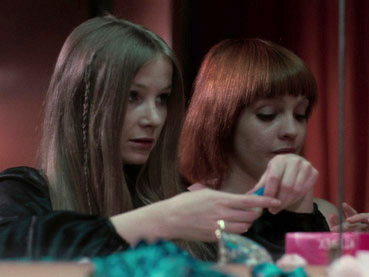
If Crowe's film was the impetus for me to change my mind about that world, to question it, to want to understand it more beyond the vision of it I'd come to know that was filtered through the less than reliable lens of nostalgia. As it turns out, all I'd have to do was wait another decade and I'd find all I was looking for. I found those answers in Lindsay Shonteff's bleak and utterly destroying take on life as a groupie, Permissive. In under ten minutes, the long-held vision I had was well and truly shattered, and just about my worst fears were realised. For Suzy (Maggie Stride) there are no perfectly quaffed curls, faux fur coats, expensive looking headscarves or life-affirming sing-a-longs to Elton John on a tour bus. Instead, it's sleazy road managers like Jimi (Shonteff regular Gilbert Wynne); nothing in the way of food unless someone takes pity on you, you're tailed by a swarm of girls perpetually two steps behind you who would stab you in the back as soon as look at you, just so they can step over you and take your place as Groupie of the Day. Did I mention that you're crushed together with the rest of the band, your fellow groupies – and whoever else is along for the ride that particular day – in a dilapidated Ford van that's probably older than you are. Oh, and to top it all off, the object of your affections would look more at home working the land living in a commune as an Eco Warrior than he would on the cover of NME.
Talk about a reality check.
The truth, as they say, is stranger than fiction, and it certainly feels like this story originates in the realms of fact. The whole thing wouldn't look out of place in the pages of the Daily Mail (and not even seventies microfiche archives) replete with a sufficiently alarmist headline.
Shonteff gets authenticity points early on for using a real-life band Forever More as his centre-piece (Alan Gorrie and Onnie Mair would later go on to form Average White Band), whilst using contemporaneous acts Comus, the acid-folk rock band, who provide the rather haunting score, and Titus Groan for later sequences where Fiona and Suzy cross paths at a gig for a rival band – or should I say tribe? –whose groupies are headed up by a fabulously bitchy blonde called Lacy (Debbie Bowen). In fact, the quartet of Forever More tracks feature so heavily, you'll find yourself knowing their lyrics by the close of the film, and at times, it does seem like a promo vehicle for the band. Though this might be seem a cutting remark, and casts Shonteff and company in rather in dim light, reducing Permissive to a piece of marketing material in the vein of modern pop musical franchise films, that's not the case at all. If anything, you'll be less likely to want to join a band or follow one after seeing this, even in spite of Gorrie's obvious musical talents.
As soon as you see the fresh-faced Suzy (Maggie Stride) walking through a busy London, bags in hand, and wearing a duffle coat no less, you know she's headed for a fall. A very large part of me was willing her to turn on her heels and head for home, before she became a newspaper headline and/or a national statistic. Thankfully, I wasn't in the scriptwriters chair for this one, and were Suzy in possession of such a weak resolve, it would make for an incredibly short and quite frankly not very interesting feature. If you're already thinking that Jeremy Craig Dryden's script will plot the downfall of a country girl exploited by nasty folk in the big city, then, well, you'd be partly correct, but there's much more to Permissive than that.
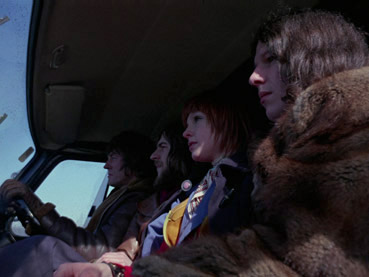
Upon meeting up with her old school friend Fiona (Gay Singleton), Suzy is speedily inducted into the world of groupies, trailing after touring band Forever More. Fiona is already something of an old hand, involved with lead singer Lee (Alan Gorrie) and she quickly becomes an unofficial tour guide for the timid Suzy (and us), lending her an outfit and fending off the advances of a rather lascivious musician, before Suzy's even had chance to step into it, signalling to this is a world with its own set of rules and very definite etiquette that's obviously poles apart from her life at home.
It's so different in fact that Suzy spends much of the earlier parts of the film staring mute and wide-eyed at the events unfolding before her behind the safety of her extraordinarily long hair. It's one of the many instances of Shonteff's surprisingly light touch, and of course brings to the fore the act of voyeurism, upon which the exploitation film usually thrives.
Permissive is more a commentary on and a rebuttal of the conventions of the exploitation genre, rather than a film which engages in and perpetuates those tropes. Shonteff's documentary aesthetic undoubtedly raises questions regarding voyeurism, but anyone expecting the exploits of Suzy and her fellow groupies to be sensual or remotely titillating will come away disappointed – Jimi's early seduction of Suzy, is a particular case in point, and it could possibly be a contender for the most unsexy love scene ever committed to film.
Permissive is both dark in theme and in style. Almost everything is conducted in smoke-filled pubs and clubs or dimly-hotel rooms and tube stations. Even the exterior scenes in the street have an air of the squalid, whether that's through the constantly overcast sky or the run-down shops and littered streets, which serve to undercut the happy-go-lucky tone of Suzy's wanderings with hippie-turned-evangelist Pogo (Robert Daubigny) who stands out as the only person who cares for and gives things to Suzy instead of taking from her.
This isn't your classic kind of cautionary tale, typified social problem and teenpic films which were born out of 1950s moral panic, this is aversion therapy, brought home by how dark and bleak Suzy's tale comes to be. This sense of foreboding and tragedy pervades the film from its early frames, thanks to the rather grim looking flash frames peppered throughout which flag up brief indications of what's to follow. Shonteff's non-linear approach to structure means that the film is sometimes hard to follow, especially later on, when Suzy is more deeply embroiled with an ever-growing list of men (and women).
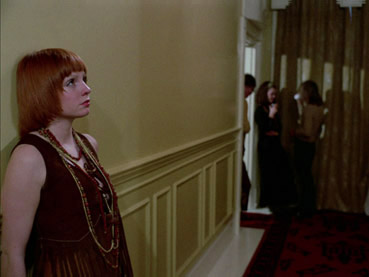
Though you're worried for Suzy early on, our opinion of her alters dramatically throughout the film. The film essentially has two acts, divided neatly by the sudden death of Pogo, when he's run over by a car. Quite simply, Suzy is never the same, and neither is the film. The long, empty park bench upon which the two share a meal is particularly heartbreaking, and stands out starkly, in a film were it becomes less and less easy to discern how much time has passed and is passing. After a time, the days seem to blur into one, marked out by band performances and sexual encounters.
In fact, it's hard to imagine the Suzy we meet in the opening moments and the one we leave behind are the same girl. By this point in time though, you've gone from liking Suzy to loathing her. Her cool regard of the dead (or perhaps near to death) Fiona is terrible to watch, when you consider how they once relied on each other. Brutal it may be, but it's just a reminder of sentiments echoed earlier in the film – people are expendable, people are replaceable. Of course, it's indicative of the revolving door policy that comes with the rock and roll lifestyle and of the wider culture of 'Free Love.' However, I believe Suzy will ultimately pay a price. Fiona's suicide comes as something of a shock, but like Suzy we've also become rather numbed by experience. That feeling just serves to make the film all the more powerful. It's not that much of a stretch to imagine her in Fiona's shoes in the not too distant future, and that's where Permissive elevates itself from beyond the norm, and definitely deserves more consideration. Throwaway it definitely is not.
Of course, Suzy's early naiveté is what makes Permissive work so well, drawing you into her plight far more deeply than its tag as an exploitation film would suggest. However, but it's still not the easiest of films to relate to, since emotionally speaking, it's a rather cold, rather soulless film, which is precisely the point. If you're enamoured with the period, the idea of being in a rock band or indeed the role of groupie is one you'd readily take on at the drop of a hat given the opportunity, then this film will leave you with much to consider. It's unlikely you'll see a film that's as grim or unglamorous as this.
Not a film you'll be using to show off the leap over DVD that Blu-ray can offer, the colour range of Permissive is restricted through costume and set design to give the film a deliberately drab and earthy look, one that's not designed to pop from the screen. That said, the transfer copes well with these imposed restrictions, with very good detail on close-ups, particularly facial detail, hair, clothing and beards, though the image is softer on some of the wide shots. The contrast is good rather than outstanding, though this may well be down to the vidual aesthetic of the original film – there are a lot of dark scenes and they have been lit to look that way, and shadow detail is correspondingly weak in places. Colours are strong when they need to be – neon signs at night are particularly good – and the blacks are generally solid. Film grain is visible, but not obtrusive. Given the difficulties offered up by the film's visual style, this is an impressive restoration and transfer.
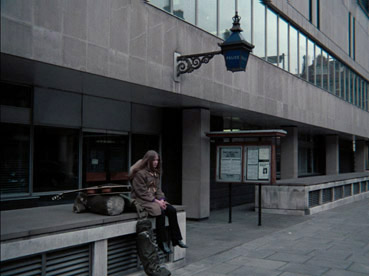
The PCM 48 soundtrack is a different story, boasting a range and clarity on music in particular that belies the film's age, despite some slight treble rattle on some of the dialogue. The accoustics in the church scene are especially strong.
Flipside releases (and BFI releases in general) are always of an immensely high standard, and this one is no exception. Permissive certainly gets the royal treatment here, with a meticulously restored transfer and a disc that's practically overflowing with extras. It's wonderful to see the obvious care and attention that BFI continue to take with films such as this, which are oft misunderstood, maligned or branded as sub-par in the never-ending debate concerning so-called 'low' and 'high' art. The Flipside strand as a whole has brought to light some real hidden gems that would have either remained forgotten relics or in the saddest of cases unseen – and there's nothing worse than that to me – without this avenue of release.
Original Trailer (2:09)
I'm not sure if I should be so amused by this, but I am. It reminded me greatly of the rather salacious yet doom-laden voiceovers that accompanied 1950s teenpic trailers, spoken with deep voices and authoritative judgmental tones – except with a slightly more 'groovy' air of course. Full of buzzwords and dramatic little phrases – "she is the now child, she is Permissive" – it feels like one of those local news items where the reporter has no real idea of their subject, which lends it a quirky sort of charm. It gives a fairly rounded view of the film itself, and thanks to the restoration work, it looks great too.
Bread [1971] (68:24)
It seems rather daft to be calling this an extra, since that title denotes something that's an adjunct to the main feature. In the case of Stanley Long's Bread, perhaps 'companion' would be a better label. If these two films were a record, then this would be the jovial, hidden treasure 'b-side' to Permissive's darker, seedier 'a-side.' Bread approaches similar themes to Shonteff's film, but adopts a lighter, comedic tone. In many ways, it's something of a forebear to the Confessions… sex comedies which Long would produce throughout the seventies – albeit in a slightly more respectable form, and the signature elements he would become renowned for are already pretty evident.
This immensely enjoyable tale follows the exploits of a group of friends Trev (Dick Haydon), Jeff (Peter Marinker), Mick (Anthony Nigel) and their girlfriends Cathy (Noelle Rimmington) and Marty (Liz White), who, while travelling back from the Isle of Wight Festival, decide to stage a music event of their own. Strapped for cash, they hatch various plots in order to make enough money or bread to see their idea through, crossing paths with land owner Rafe (Mike McStay) and his wife Terry (Yoki Rhodes) when they camp out on the grounds of a Stately Home. They're and enterprising bunch and do everything from a bit of home renovation, hocking coca-cola (which rather undercuts their anti-capitalist ranting, but still, needs must) and finally, and most amusingly of all, turning their hand to the world of Adult Entertainment in an attempt to make their very own porn film, beating Kevin Smith's equally cash-challenged duo, Zack and Miri to the punch by several decades.
Its opening moments look more like a music documentary-turned-promo for the festival itself and Long continues cuts back and forth between festival goers and our entrepreneurial little gang throughout the film. Though it might have been done to give shape and flavour to the proceedings – which works to an extent – I personally found it a tad distracting. However, for those who like a bit of authenticity, the film features music from real-life bands Crazy Mable and Juicy Lucy.
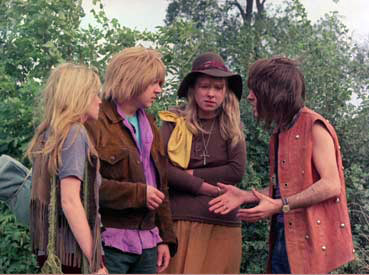
In typical British fashion, our first meeting with the group finds them unhappy with their lot. Instead of taking everything in, they're sat in the grass against a van, bemoaning the quality of their sandwiches before criticising the price of just about everything else. This is just a typical example of the very particular kind of British humour the film extols – only in our great nation could we moan about something as trivial as that – and quickly sets the tone for the rest of the film.
Bread certainly packs a lot into its runtime, moving along at a fair old pace. With strong performances from the ensemble cast, it's hard to find fault with it either. Emblematic of the term 'guilty pleasure,' thanks to the restoration work completed by the BFI, it's one that's never looked better either. This came as a rather lovely surprise and a welcome one at that. If only all supplementary extras were this substantial!
Bread Mute Outtakes (16:33)
I admire thoroughness and care in regard to DVD releases, and this is where BFI excel. Though it might at first seem redundant to include mute scenes from a film about music, I think it's important these extra minutes – compiled from the original eighty-five minute version of the film – are here for the sake of archival and to the joy of completists like myself. Even if it is odd to watch over fifteen minutes of silence, they're a very nicely composed fifteen minutes to be watching, and perhaps point to a different kind of film to the one contained in the final cut.
For further information on the various version of Bread, see 'Sliced Bread: How Bread was Cut,' in the accompanying booklet.
Ave You Got a Male Assistant Please Miss? [1973] (4:27)
Previously seen on BFI's The Joy of Sex Education, this was originally produced by Oxford Polytechnic for The Family Planning Association, aimed squarely at sexually active young people, it extols the virtues of safe sex in order to avoid unwanted pregnancies.
If there's such a thing as a 'cool' sex education film, then Male Assistant might be it. There's no hellfire and brimstone for these bright young things, only genuinely practical safe sex advice, with a rather amusing main sequence shot at double-speed a la Keystone Cops comedies when the young man (Eelco de Jong) goes across town in search of condoms while his girlfriend (Pip Springhall) waits back in bed at their student flat. It's a refreshingly comedic little piece, but with a serious underlying message that was and probably still is more likely to make people think about their actions and take appropriate precautions, than if it were delivered in usual serious and frankly rather dull tone common to films of this type.
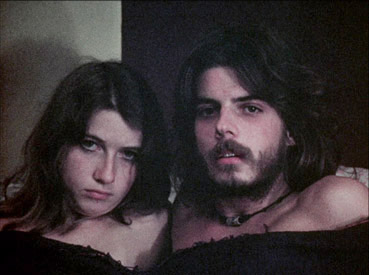
At first, this might seem a rather odd inclusion, but of course, Male Assistant is merely
symbolic of and another take upon permissive behaviour – albeit in a very contained manner – and combined with Bread, there are some interesting parallels one can draw between the three very different films.
Booklet
This full-colour illustrated booklet is a real bonus for a film like Permissive since, for me at least, it filled in a lot of the blanks regarding the background to the film and its production, as well as for extra features Bread and 'Ave You Got a Male Assistant Please Miss?
The majority of its thirty plus pages is devoted to a collection of short essays which approach the film from various perspectives from a diverse array of contributors. The first and longest of these 'Permissive,' by academic and writer I.Q. Hunter, which discusses the film within the context of the sexploitation genre, with specific attention devoted to Permissive's style and narrative. Following this is 'Underground Wonders: The Music of Permissive,' written by Lee Dorrian, former member of Birmingham-based mental band, Napalm Death now a record company owner and producer. As opposed to a straightforward soundtrack discussion, Dorrain's article also provides us with a picture of the music scene which surrounded the making of the film. Next up, is 'Comus on Permissive,' a biographical article-turned-interview with Comus, devoted to their involvement with the making of Permissive, their opinions on the film, and their continued relationship with Lindsay Shonteff after the production.
The second half of the booklet begins with a short but detailed biography of Lindsay Shonteff, by academic Robert Murphy, which gives some interesting details on the diversity of Shonteff's output post Permissive, and considers Allan Bryce's idea that there may exist a 'Shonteff touch' a la Ernst Lubitsch, identifying common tropes throughout the director's work to support his theory. Intriguing stuff.
Equally interesting is the first of several contributions by fiction historian at the BFI National Archive, Vic Pratt. Beginning with 'A Counterculture Gimmick Movie: Stanley A. Long's Bread.' In addition to summarising the relationship between film, music and youth culture – no mean feat – Pratt frames his discussion of Permissive in terms of the value and rarity of the film's performance footage. Given the rather seedy connotations of the sexploitation tag Permissive is labelled with, it's a genuinely thought-provoking piece, and throws up a fair amount of questions in regard to the preservation of archive film footage and changing circulations of taste. Bringing the section on Bread to a close is the amusingly titled 'Sliced Bread: How Bread was Cut,' which details the various versions of the film in existence, and the steps taken by BFI to restore it. Those wondering why the mute extracts from the film are included as an extra will find the answer here. Vic Pratt crops up again as the author of the second biography in this collection, this time for Bread director, Stanley Long. A more traditional style is employed here, focussing on the details of Long's upbringing and reputation as a director, quite different from Murphy's exploration of Shoneteff, which is markedly more academic in tone and feel. The final article in the booklet is given over to the final extra, the Graham Jones and John Astley short, Ave You Got a Male Assistant Please Miss? Written by scholar and curator James Piers Taylor, this piece gives a pleasingly full picture of the film, exploring its production, aesthetic and relationship to 1970s culture.
Also included are production credits for Permissive and the extras included in the set, as well as further restoration notes in addition to those provided for Bread. Both an informative and entertaining read, it's a great compliment to the film, and developed my understanding of it immensely.
Lindsay Shonteff is largely thought of as something of an unsung hero in British filmmaking, this release should go some way redressing that imbalance. Permissive is a powerful and cleverly constructed film which provides an interesting and authentic take on a period we so often tend to idealise, mythologise and/or reduce to the well-worn iconography found within popular culture. This is another fine addition to the Flipside strand with a great set of extras, and will sit nicely in any collection along with sister releases Privilege and That Kind of Girl. Highly recommended.
|